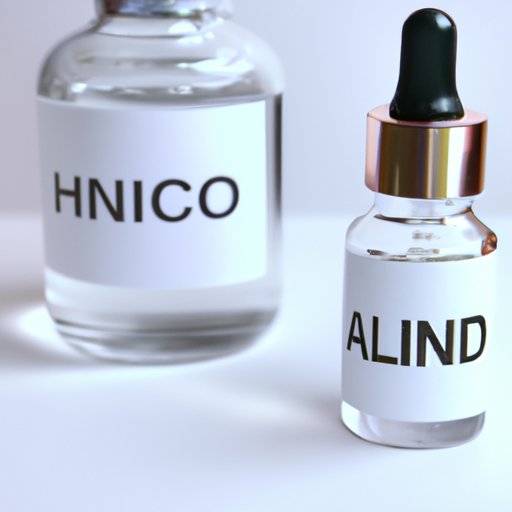
I. Introduction
Retinol and hyaluronic acid are two popular ingredients in the world of skincare. Retinol is a form of vitamin A that stimulates collagen production and helps to reduce wrinkles and fine lines. Hyaluronic acid is a hydrating compound that can hold up to 1,000 times its weight in water, making it an excellent ingredient for hydrating the skin.
The question that many people have is whether or not it’s safe to use these two powerful ingredients together. In this article, we’ll explore the benefits of combining retinol and hyaluronic acid, expert opinions on the topic, and the best practices for incorporating these ingredients into your skincare routine.
II. The Ultimate Guide to Skincare: How to Combine Retinol and Hyaluronic Acid for Optimal Results
Retinol and hyaluronic acid work differently on your skin, but they can both provide excellent benefits when used together. Retinol stimulates collagen production, which can help to reduce the appearance of wrinkles and fine lines. Hyaluronic acid hydrates and plumps the skin, making it look smoother and more youthful.
Using both of these ingredients together can help you achieve optimal results for your skin. The retinol will help to stimulate collagen production, which can lead to firmer, more elastic skin. At the same time, hyaluronic acid will help to hydrate and plump the skin, further reducing the appearance of fine lines and wrinkles.
When incorporating these ingredients into your skincare routine, it’s important to use them in the correct order. Start by applying hyaluronic acid to your skin, then wait a few minutes before putting on the retinol. This will allow the hyaluronic acid to fully absorb into your skin and provide maximum hydration before the retinol is applied.
III. Beauty 101: Can You Use Retinol and Hyaluronic Acid Together? Here’s What the Experts Say
There is some debate among experts about whether or not it’s safe to use retinol and hyaluronic acid together. However, most experts agree that it’s safe to use these ingredients together, as long as you take proper precautions.
Retinol can be irritating to the skin, especially if you have sensitive or dry skin. Hyaluronic acid can help to mitigate this irritation by providing hydration to the skin. When using these two ingredients together, it’s important to start with a low concentration of retinol and work your way up slowly to avoid irritation.
IV. The Dos and Don’ts of Mixing Retinol and Hyaluronic Acid in Your Skincare Routine
The key to mixing retinol and hyaluronic acid in your skincare routine is to use them in the right order and in the right concentration. Here are some dos and don’ts to keep in mind:
- Do apply hyaluronic acid to your skin before applying retinol
- Do start with a low concentration of retinol and work your way up slowly
- Do use a moisturizer after applying retinol to help avoid irritation
- Don’t use retinol and hyaluronic acid together if you have extremely sensitive skin
- Don’t use retinol and hyaluronic acid together if you are pregnant or nursing
If you experience any irritation or redness after using these ingredients together, stop using them immediately and consult a dermatologist.
V. Why Retinol and Hyaluronic Acid are the Perfect Skincare Power Couple
Retinol and hyaluronic acid are the perfect skincare power couple because they work together to fight the signs of aging and reduce blemishes. Retinol stimulates collagen production, which can help to reduce the appearance of wrinkles and fine lines. Hyaluronic acid hydrates the skin, making it look smoother and more youthful.
The combination of these two ingredients can help to improve your skin’s texture and appearance at a cellular level. Retinol stimulates collagen production at the dermal layer of the skin, while hyaluronic acid hydrates the epidermal layer of the skin. Together, they work to improve skin elasticity, reduce blemishes, and leave your skin looking radiant and youthful.
VI. A Beginner’s Guide to Mixing Retinol and Hyaluronic Acid in Your Daily Skincare Regimen
If you’re new to using retinol and hyaluronic acid in your skincare routine, here are some tips for getting started:
- Start with a low concentration of retinol and work your way up slowly
- Use hyaluronic acid before applying retinol to fully hydrate your skin
- Be cautious when using these ingredients around the eye area
- Use them at night, as retinol can make your skin more sensitive to sunlight
- Be patient – it may take several weeks to see the full benefits of using these ingredients together
It’s also important to choose the right products when using retinol and hyaluronic acid together. Look for products that are designed to be used together, or choose a serum that contains both ingredients. This will ensure that you are getting the optimal benefits from using these ingredients together.
VII. Conclusion
Retinol and hyaluronic acid are two powerful skincare ingredients that can provide excellent benefits when used together. While there is some debate among experts about the safety of using these ingredients together, most agree that it’s safe as long as you use them in the right concentration and order.
By following the best practices outlined in this article, you can start using retinol and hyaluronic acid together and experience the amazing benefits for yourself.





